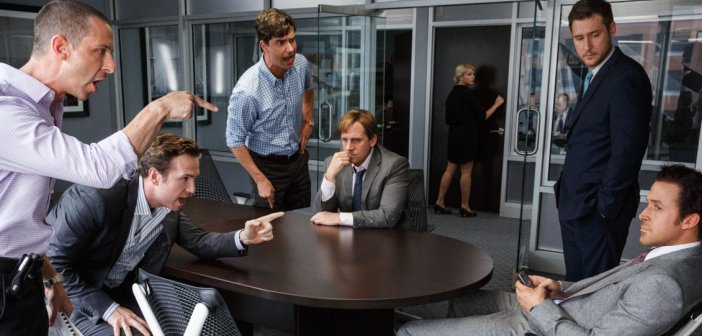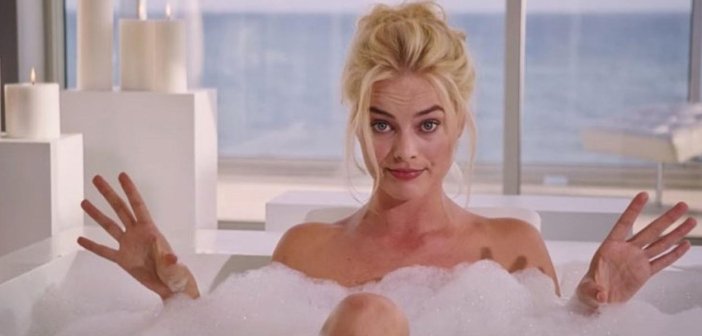Oscar Watch | Why The Big Short Should Win Best Picture
The eight Best Picture nominees at this year’s Oscars are all superb examples of film at its peak. The most striking element of the category is the range of styles and the variation of genres. We have cold war thrillers, emigration romances, sci-fi survivals, historical epics, post-apocalyptic action and political thrillers. Top that off with huge Irish interest in Room and Brooklyn and we have one of the most exciting races for Oscar glory in many years.
But how do you choose between something like the brutal, visceral and visually stunning Mad Max and the deft, heartbreaking power of Room? How can the story of paedophile priests compare with that of Matt Damon stranded on Mars? What truly makes a Best Picture? Well, technically, it is whatever the old white fogies at the Academy vote for, but for me it has to be the film that brings together all the elements – the script, style, performance, emotional impact – to make the one perfect moment when you realise you are watching something truly special. That film, this year, was Adam McKay’s The Big Short.

Based on Michael Lewis’ 2010 non-fiction account of the financial meltdown, The Big Short: Inside the Doomsday Machine, Adam McKay’s film recounts how a number of people spotted the impending doom and bet against the American housing market, and in doing so became unwitting observers, like watching a car crash from a distance, to the collapse of the world economy. What McKay did was deliver a film seething with anger, laced with humour and encapsulated in a stunningly inventive method of achieving accessibility. I know what a CDO is, I know what a credit default swap is, I know what combined to destroy the lives of millions of people, not only in America, but across the western world.
The opening act of The Big Short is a heady montage establishing the totality of consumerism – quick cut frames of iPods, Starbucks, mansions and pools – set against the backdrop of a financial system devoid of regulation. This important intro not only establishes the economic situation but it ceaselessly points out a world that seems somewhat deranged and obsessed, a world that feels out of place despite the fact is it less then 10 years ago. The key scene that follows, when hedge fund manager Steve Carell travels to the ghost estates of Florida and confirms the fears that a housing bubble is on the verge of bursting – the ball dropping via a conversation with a stripper – is the dramatic turning point at which The Big Short hinges. The tone shifts from this playful, pop-culture referencing equilibrium to the inevitable reality of the stupidity of greed. The story enters the dark territory where financial armageddon is inescapable, as we all know. Because we know, the feeling of dread and anger grows exponentially from this point as the financial system reveals itself to be both corrupt and utterly blind. In one scene, the financial regulator is actually in bed with the big banks.
It is no surprise that The Big Short was also nominated for a Best Adapted Screenplay award. The key to delivering the important messages of Michael Lewis’ book to the screen comes from McKay’s comedy background (his previous credits include Anchorman, Step Brothers and The Other Guys) and his inventiveness in understanding that the method of delivery is as important as the message itself. Adapting the intricate complexities of the financial crisis into a film would always be a tough task. To turn it into a hilarious, ghastly drama is genius. Combining the self-aware narration and the three inspired cutaways to celerities used to explain some of the most convoluted and complicated financial policies which defined the collapse, allowed McKay to inform effortlessly and in tune with the tone of the film which flirts with horror at ease. The first of these cutaways is to Margot Robbie, sipping champagne in a bubble-bath, as she explains how sub-prime mortgage bonds degraded in the run up to the crisis. This is an incredibly interesting scene and happens within the first 15 minutes. To cut away from the narrative to a celebrity talking directly to the camera is attention grabbing. When that celebrity is Margot Robbie, naked in a bath, you can guarantee McKay has your attention. Combine this with the jump cuts, quickly alternating camera angles and McKay can feed you the vital, arduous information that is key to understanding the core of the crash. It is jarring, it makes you sit up and concentrate, it is a genius way of informing you. The film is also, unsurprisingly, nominated for an Oscar in Editing.

This style of storytelling, the constant use of devices – the cutaways, the on screen graphics, the freeze frames, the narration – all delivered at a frantic pace require the performances of the actors to actually make the film relevant to the viewer. To bridge emotion. While Christian Bale was nominated for a Best Supporting Actor Oscar for his assured and subtle performance as Dr. Michael Burry, the genius who was first to see the inevitable, it is Steve Carell’s performance as Mark Baum that is the key to the film’s emotional impact. His character mirrors the viewer’s emotional responses. As the reality of the situation dawns on Baum, he becomes the anger felt by us all as we begin to understand the true gravity and, consequently, the reasons why this happened. We are on his journey into the abyss. This performance is a conduit for the venting of all the hate people feel towards a system that so tragically betrayed us. Mark Baum’s brother has committed suicide before the events of the film and this emotional lever is used to make a huge story undeniably personal, both for Baum and the viewer.
Acting, directing, editing, storytelling, style, impact – all are combined and delivered with great substance throughout The Big Short, more so than any other nominees in this category. The importance of the film also lies in the documentation of facts that caused such a dreadful insult to millions of people. Knowing that not one person has ever been held accountable for something so appallingly important to our society, is the final message delivered by The Big Short. This sombre note is the full stop of an essay on the decline of modern society, both in terms of its obsession with capitalism and the corrupt failures of the most powerful people on this planet. Like that first scene with Margot Robbie, The Big Short pulls you from your insulated reality and begs attention, it makes you listen, it makes you angry, it makes you care, it makes you realise you’re watching something truly special.
Check out the arguments for the other nominees here:
Brooklyn
Mad Max: Fury Road
The Revenant
Bridge of Spies
The Martian
Spotlight
Featured Image Source

